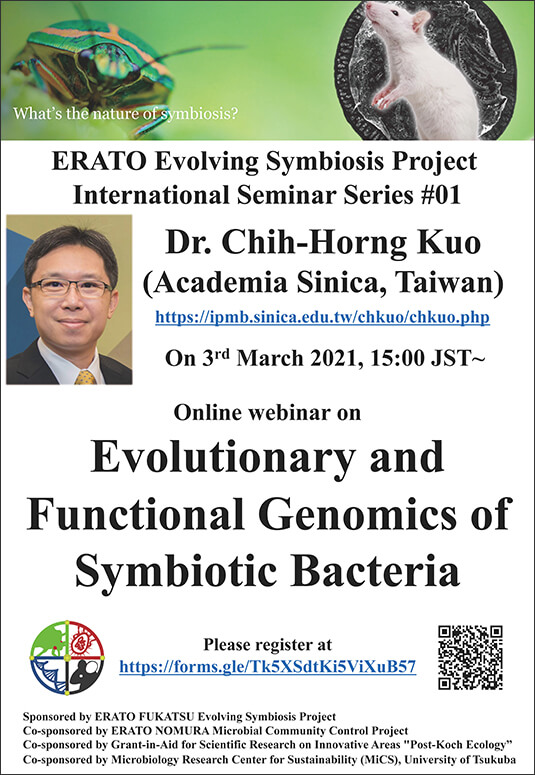ERATO Evolving Symbiosis Project International Seminar Series #01
Dr. Chih-Horng Kuo (Academia Sinica, Taiwan)
"Evolutionary and Functional Genomics of Symbiotic Bacteria"

Abstract: In microbial evolution, the development of a host-dependent lifestyle often has profound effects on the genome architecture. To better understand the evolutionary processes involved, as well as the functional consequences of changes in the gene content, our research group utilize genomics tools to conduct comparative analyses among bacteria with different ecological niches. In recent years, our major study systems include two genera within the class Mollicutes. The genus Spiroplasma contains species that are commensals, pathogens, or mutualists of diverse arthropod hosts. Our comparative analysis revealed that the patterns of genome evolution varied widely among different clades within this genus, and horizontal gene transfer appeared to be a recurrent theme that is linked to the evolutionary transitions between different ecological niches. Moreover, comparative transcriptomics analysis demostrated that genes acquired from independent events were integrated into the regulatory network of their new host genome and form functional modules, which illustrated the flexibility of these symbiont genomes. The second genus, ‘Candidatus Phytoplasma’, contains uncultivated bacteria that are all insect-transmitted plant pathogens. These phloem-restricted endosymbionts can systematically reprogram the development of their plant hosts by effectors. Notable symptoms of infection include phyllody (i.e., abnormal development of flower parts into leafy structure), witches’-broom (i.e., extensive proliferation of auxiliary shoots), and stunting (i.e., small flowers and leaves). We found that phytoplasma effector genes are often associated with potential mobile units on the chromosome, and these mobile genetic elements may facilitate gene flow between divergent lineages. Taken together, our findings suggested that the genome evolution of these symbionts are far more dynamic than previously thought. To further improve our understanding of these bacteria, our on-going work aims to functionally screen and characterize key genes that are linked to their adaptation.
ERATO Evolving Symbiosis Project International Seminar Series #01
Sponsored by ERATO FUKATSU Evolving Symbiosis Project
https://www.jst.go.jp/erato/fukatsu/english/
Co-sponsored by ERATO NOMURA Microbial Community Control Project
https://www.jst.go.jp/erato/nomura/en/index.html
Co-sponsored by Grant-in-Aid for Scientific Research on Innovative Areas "Post-Koch Ecology"
https://postkoch.jp/about/
Co-sponsored by Microbiology Research Center for Sustainability (MiCS), University of Tsukuba
https://www.mics.tsukuba.ac.jp/en/


